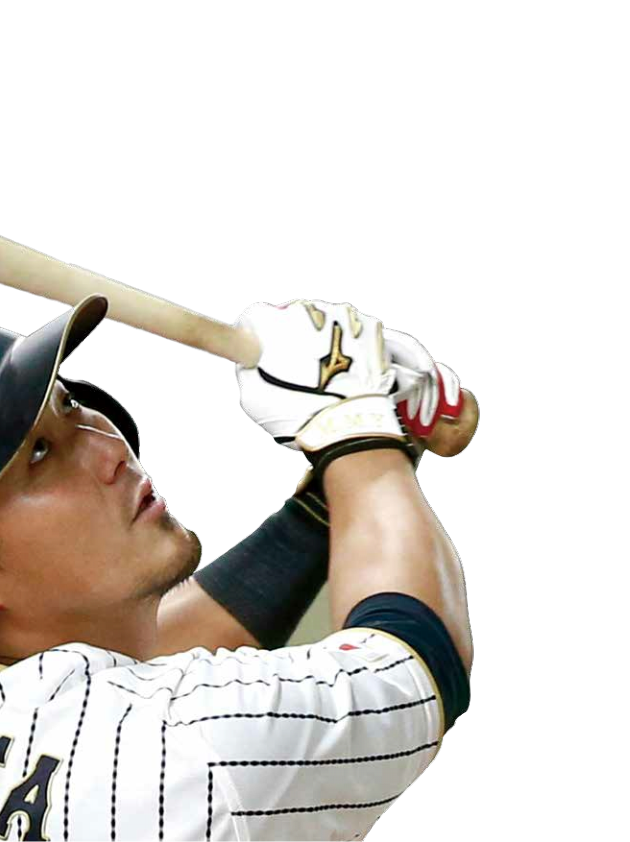Issue:

Above, the author at work; below, Japan’s Sho Nakata at the World Baseball Classic in March
Covering sports in Japan is not much different than anywhere else, requiring knowledge of the games, a curious mind and a willingness to sometimes bend the rules.
Ionce almost knocked down Masahiro Tanaka on a flight of stairs.
It wasn’t on purpose, of course. Balance was a tenuous proposition at Seibu Dome that day. I was walking in the midst of a pack of at least eight journalists all trying to speak with Tanaka after a game while maneuvering up the stairs heading out to the parking lot. The stairwell isn’t narrow, but wouldn’t be mistaken for wide either, especially not with a gaggle of people going up it all at once struggling to stay within hearing range. I slipped a little, catching myself before I ended up falling face first into the white No. 18 on the back of Tanaka’s red Tohoku Rakuten Golden Eagles uniform and possibly injuring him and his golden arm.
That was in 2013. Tanaka, one of Japan’s best pitchers, would finish that season 24–0, a Japan Series champion, the Pacific League MVP and owner of Guinness World Records for most consecutive games won by a pitcher (30), most consecutive regular-season games won by a pitcher (28) and most consecutive games won by a pitcher in a single regular season (24). Now, Tanaka pitches for the New York Yankees, and I remain grateful for having kept my balance.
It probably wouldn’t have happened in the U.S. There, media are given time with players like Tanaka in the club house, instead of having to catch them on their way to the team bus. But such is life covering sports in Japan. There are times the facilities, tools and general media considerations sports reporters have in other places are lacking which sometimes effects how you report on things.
Aside from this, which does take getting used to, reporting on sports in Japan isn’t wildly different than elsewhere. Where the experiences diverge can mostly be chalked up to simply being the way Japanese do things which is, of course, a common refrain of many of the foreign players who come here. Like them, you’re operating in a different environment with a different language and different cultural norms and nuances. Jeremy Powell, who pitched in Japan for eight seasons, told me once that one of the most important things for players is the “ability to have an open mind and embrace the Japanese way.”
GETTING ALONG REQUIRES AT least a tacit understanding of how things work, but it doesn’t mean that foreign journalists have to totally adapt to how the Japanese media oper-ates. Sometimes we find ourselves reporting on things the Japanese media might overlook (though reporters for the tabloids, who are not afraid of retaliatory actions, tend to do this already). Stepping outside of the norms is how best selling author Robert Whiting ran afoul of the Yomiuri Giants organization, easily the most powerful singular entity in Japanese baseball maybe all Japanese sports in 1990 when he reported that the club was announcing false attendance figures rather than taking the team’s word at face value like everyone else. Whiting was banned from Tokyo Dome indefinitely for his troubles. He was also, of course, right.
It doesn’t usually get that dramatic these days. When I reported on one notable controversy writing in 2008 that manager Bobby Valentine claimed someone in the Chiba Lotte Marines front office had asked him to resign there was no kickback from the team. Oddly, though, the team did try to crackdown on reporters who were covering Valentine’s firing in 2009 with media guidelines that reportedly included a ban on wearing jeans.

The kisha clubs that control the flow of information from the Japanese government also exist in sports. They’re divided by region, with different sports and leagues handling things in their own way. But they don’t seem as heavy-handed as those covering the government, lacking for the most part, the hostile attitude toward non-members. Leagues and organizations have been slow to embrace internet media, however, and reporters from these companies sometimes run into access issues.
Generally no reporter, kisha club member or not, is allowed in locker rooms. Some sports have mixed zones, where you wait for the players to walk by and hope to catch them. For baseball, there is just a lot of waiting for the players to come out of the clubhouse and firing questions at them on their way to their cars or the bus. Some may stop to speak with reporters, others will speak while walking, and others ignore us. It mostly depends on the mood the player is in, which depends a lot on how that day’s game went. In some baseball stadiums, you can walk with the players to the clubhouse, which offers another opportunity, but that depends on the layout.
I once got into a locker room by accident. Greg LaRocca, who was playing for the Orix Buffaloes, had promised to answer a few questions, but found himself out of time. Nice guy that he was, LaRocca’s solution was to pull me by the arm into the visitor’s locker room at Chiba Marine Stadium and do it there. Other than a few odd looks, the Buffaloes staff didn’t say anything.
ONCE YOU ACTUALLY GET to speak with the players, it’s the same all over the world: we try our best to get something beyond the typical athlete clichés, something that we can make news with, or at least make our write-ups more interesting.
Some players actually seem more relaxed around a foreign reporter and tend to deviate from the normal stock answers. Some are curious as well. A meeting with the Seibu Lions’ pitcher Yusei Kikuchi once extended for several minutes because he wanted to quiz me on how I ended up covering baseball in Japan. Conversely, there was a basketball player, who shall remain nameless, who couldn’t have been less interested in being interviewed, and very likely would have even answered a question about the meaning of life with a curt “yes” or “no.”
“There is a poetic quality to sports writing, which is one reason I like it despite the issues. The heat of battle, of competition between opposing forces, breeds great drama and stories”
Softball pitcher Yukiko Ueno was great the couple of times I’ve interviewed her, giving thoughtful answers, smiling through it and being generally pleasant, while Seiichi Uchikawa of the Hawks is always attentive if he’s got time and one of the best interviews in baseball. As an organization, the Hokkaido Nippon Fighters are top-class in terms of access and communication. With enough lead time the Fighters staff will make a good effort to honor player requests, both home and on the road. They make their players available when possible, work to reschedule in the event either you or the player has an unavoidable conflict and are quick to respond to queries, which is rarer than it should be. They don’t always say yes to everything, but their PR staff is very good at working with the media.
Japanese reporters are usually more interested in the mechanics of what happened, rather than the narrative focus on “why” that you see many sports reports in the West take. Of course, as with all journalism, the answers are usually only as good as the question that is asked. Prior to Game 1 of the 2007 Japan Series, a Japanese reporter leaned in and asked Trey Hillman, a down-to-earth Texan who managed the Hokkaido Nippon Ham Fighters from 2003 to 2007, what he and his wife had discussed over breakfast that morning. Hillman just shook his head and said in his Texas drawl, “I’m not going to tell you what my wife and I talked about this morning.”
Most Japanese reporters are helpful, used to the give and take of the media environment. Sometimes I can even be of help to them, as in an interesting experience I had during the Japan Series in 2014. Earlier the that year, Hanshin Tigers outfielder Matt Murton had been caught up in controversy when something he said was mistranslated by a Japanese reporter. The mistranslation (an innocent mistake as opposed to a malicious one) seemed to infer that Murton had made a mistake on the field just because he didn’t like one of his teammates. As everyone knows, the media around the Tigers is as voracious as their mascot, and the story blew up. Murton, who loved Japan and was always easy with his time for the media, was a little more measured in his dealings with the press after that.
So after Game 1 of the Japan Series at Osaka’s Koshien Stadium, I walked with him back to the clubhouse, going over the game. When our conversation ended, I turned to see a throng of eager reporters’ faces, desperate to know every detail of what Murton had said. Just like that, I was the main attraction in a press scrum. It was a very, very small glimpse into what we put the players through daily.
WHILE THERE ARE CHALLENGES, there is still a poetic quality to sports writing, which is one reason I like it despite the issues. The heat of battle, of competition between opposing forces, breeds great drama and stories.
Also, as much as professional sports are essentially children’s games played on the grand stage, to the athletes, the games are a major part of their lives. They are part (not the whole) of who these people are, and the person they are helps make up the athlete they become.
Through the games and the people who play them, you can discover things that are more important than sports, their real-life triumphs and defeats, highs and lows that may also help understand why this basketball player works so hard at her craft, or, for example, why a football player’s mother may have been the one to share the love of the sport with him and broken a barrier by bucking social norms and playing the game herself; in fact, her story may be the more interesting one for both social and sporting reasons.
Sports is human drama, and finding those things makes the search for them, and the hurdles you have to leap over sometimes, worthwhile.
Jason Coskrey covers sports for the Japan Times.

